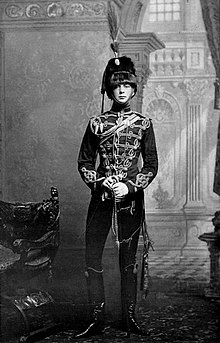The Hessian boot (/ˈhɛsiən/; from Hesse in Germany) is a style of light riding boot that became popular from the beginning of the 19th century.[1]

History and description
editFirst worn by German soldiers in the 18th century, these military riding boots became popular in England, particularly during the Regency period (1811–1820), with their polished leather and ornamental tassels. Initially used as standard issue footwear for light cavalry regiments, especially hussars, they would become widely worn by civilians as well[2] in both equestrian pursuits and other outdoor activities.
The boots had a low heel, and a semi-pointed toe that made them practical for mounted troops, as they allowed easy use of stirrups.[3] They reached to the knee and had a decorative tassel at the top of each shaft, with a "v" notch in front.[4] The Hessian boot would evolve into the rubber work boots known as "Wellington boots".
See also
editReferences
edit- ^ Carman, W.Y. (1977). A Dictionary of Military Uniform. Scribner. p. 72. ISBN 0-684-15130-8.
- ^ Fiona McDonald (30 July 2006). Shoes and Boots Through History. Gareth Stevens. ISBN 978-0-8368-6857-9. Retrieved 26 January 2012.
- ^ Chambers's encyclopaedia: a dictionary of universal knowledge. W. & R. Chambers, Limited. 1901. pp. 321–. Retrieved 27 January 2012.
- ^ Carman, W.Y. (1977). A Dictionary of Military Uniform. Scribner. p. 72. ISBN 0-684-15130-8.